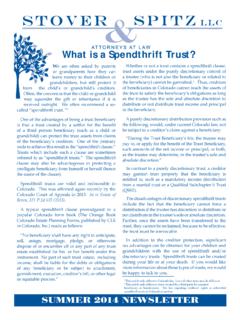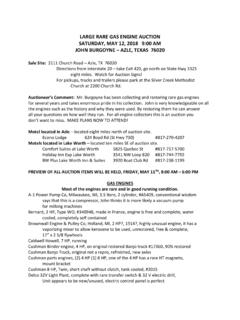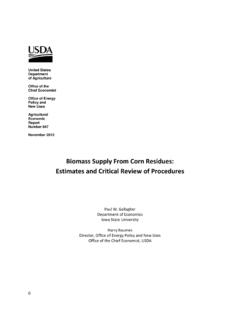Transcription of The Colorado Lawyer December 1999 Vol ... - …
1 The Colorado Lawyer December 1999 Vol. 28, No. 12 [Page 39] 1999 The Colorado Lawyer and Colorado Bar Association. All Rights Reserved. Specialty Law Columns Estate and Trust Forum The Perilous Federal Gift Tax Return--Part II by Thomas L. Stover Editor's Note: This is the second part of a two-part article on the federal gift tax return ("GTR"). Part I, which appeared in the November 1999 issue at page 71, reviewed basic reporting rules and focused on the gift tax statutes of limitation, and the proposed regulations on adequate disclosure of gifts. Part II discusses the generation-skipping transfer ("GST") exemption allocation rules and their practical application to the federal GTR.
2 Some knowledge of the tax on GSTs under Chapter 13 of the Internal Revenue Code ("Code") is assumed for purposes of this article. As wealth increases, and the population ages, GST planning will loom larger. All lifetime GST planning requires a consideration of the exemption allocation rules and, usually, the Form 709. The goal of this article is to highlight issues and provide limited, practical guidance for allocation of the GST exemption on the Form 709--United States Gift (and Generation-Skipping-Transfer) Tax Return. The Code, the Regulations, and a good treatise are deemed Allocation of GST Exemption The generation-skipping transfer tax ("GSTT") is in addition to the estate and gift tax, and is imposed every time there is a GST, which includes taxable terminations, taxable distributions, and direct skips (subject to certain exceptions), at the rate of 55 percent.
3 Every donor is allowed a lifetime exemption from GSTT. The current exemption of $1,010,000 per donor will be indexed annually for The donor can apply this exemption to inter vivos transfers or to transfers taking effect at death. If a trust is fully exempt, it has an "inclusion ratio" of Future transfers to skip persons from a trust with an inclusion ratio of zero will be exempt from the GSTT. With proper planning, and early allocation, the GST exemption can be leveraged to result in the transfer of substantial amounts of wealth to skip persons (that is, grandchildren and other persons assigned to a generation that is two or more generations below the generation of the transferor).
4 Gifts That Are Direct Skips Gifts that are inter vivos direct skips made after September 25, 1985, must be reported on Part 2 of Schedule A of Form 709. An inter vivos direct skip is a transfer made during the donor's lifetime that is (1) subject to the gift tax, (2) a gift of an interest in property, and (3) made to a skip A transfer is subject to the gift tax if it is required to be reported on Schedule A of Form 709. This may include split gifts. A skip person can be a natural person or a trust. A donee who is a natural person is a skip person if that donee is assigned to a generation that is two or more generations below the generation assignment of the donor.
5 A donee that is a trust is a skip person if either (1) all the present interests in the property transferred to the trust are held by skip persons, or (2) there are no interests in the property transferred to the trust held by any person, and future distributions or terminations from the trust can be made only to skip However, gifts in the form of charitable remainder trusts ("CRT") are not treated as direct skips, even if all the life beneficiaries are skip persons, and therefore should always be reported on Part 1 of Schedule The transferor to a CRT may wish to allocate GST exemption to the CRT by Notice of Allocation, as described below, if any of the noncharitable beneficiaries are skip persons.
6 Exclusion from GSTT Generally, direct skips that are nontaxable gifts [due to the annual, medical, or educational exclusions of Code 2503(b) and (e)] also are excluded from the Excluded gifts do not require allocation of GST exemption. However, an important exception exists. If an otherwise nontaxable gift is a direct skip to a trust, the gift will be subject to the GSTT unless: (1) during the lifetime of the individual beneficiary of the trust, no corpus or income may be distributed to anyone other than the beneficiary; and (2) if the beneficiary dies before the termination of the trust, the assets of the trust will be included in the gross estate of the beneficiary.
7 These trusts are described in, and commonly referred to as, Code 2642(c) trusts. Trusts created for the benefit of a minor pursuant to Code 2503(c) should qualify for GST exclusion under Code 2642(c). However, gifts to a trust for the benefit of several of the donor's grandchildren, all of whom are given Crummey withdrawal rights, could be excluded from the gift tax but will not be excluded from the GSTT, unless the trust creates substantially separate shares for each grandchild. These gifts would not meet the requirements of Code 2642(c) because the trust has more than one beneficiary. The gift also would fail to qualify under Code 2642(c) if the trust had only one beneficiary but the trust would not be included in the beneficiary's estate if he or she died prior to termination of the trust.
8 If the gift in trust fails to qualify under a Code 2642(c) trust, GST exemption must be allocated to the trust to yield an inclusion ratio of zero. Gifts reported on Part 2 of Schedule A must be listed in chronological order, and, for GSTT computation purposes, the gift tax annual exclusion allowed against the GSTT must be allocated to the maximum allowable amount on a gift-by-gift basis in chronological order, beginning with the earliest gift that qualifies for the For any direct skips in excess of the exclusion allocated to such gift, GST exemption must be allocated to produce an inclusion ratio of zero. The automatic allocation rules discussed below will normally operate to allocate sufficient GST exemption to any nonexcluded portion.
9 Automatic ("Deemed") Allocation In the case of inter vivos direct skips, a portion of the donor's unused GST exemption is automatically allocated to the transferred property to make the inclusion ratio zero, or as close to zero as possible, unless the donor elects In the rare situation where it is desirable, the donor may elect out of the automatic allocation on a timely filed Form 709 with a statement attached describing the transaction and the extent to which the automatic allocation is not to apply. Reporting a direct skip on a timely filed Form 709 and paying the GSTT on the transfer will qualify as such a statement. In general, the automatic allocation of GST exemption becomes irrevocable after the due date for reporting the transfer if it were a taxable gift, including any extensions actually granted.
10 If an election out of the automatic allocation is made, the election becomes irrevocable when The practitioner should consider actually allocating GST exemption on a timely filed GTR to reportable direct skips even when the deemed allocation rules would apply. This makes it clear that GST exemption has been allocated and provides a record of the inclusion ratios and amount of the exemption used for later use. Gifts That Are Not Direct Skips For gifts which may or may not be subject to the gift tax, but are not direct skips, there is no automatic allocation of GST exemption. For example, a gift to a trust that has the donor's children as present interest beneficiaries and the donor's grandchildren or great-grandchildren as future beneficiaries would not be a direct skip because the present interests in the trust are held by nonskip persons.








